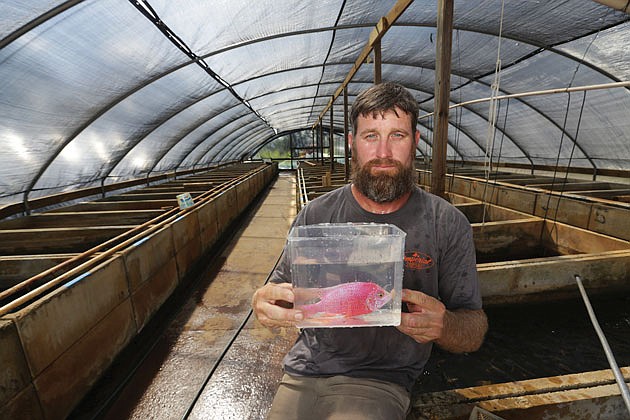- November 24, 2024
-
-
Loading

Loading

By John Haughey | Contributing Writer
Mike Drawdy has done a lot in the name of fish.
For instance, there was the time he bushwhacked into the jungle of northern Argentina, where he hired a guide who helped him find Golden Sailfin Pleco, a rare armored catfish only found in the Rio Uruguay basin.
That swashbuckling trip, he says, was worth it: It helped established a source to ship the fish directly to his Lakeland farm to breed and sell. Three years later — even at $1,000 each — that company, Imperial Tropicals, can't keep enough in stock to meet demand generated by a robust online sales platform that helped save the third-generation business. “We're seeing a little bit of a rebirth — the market is coming back,” Drawdy says.
The Florida Tropical Fish Farms Association says Florida's aquarium fish industry produces more than 600 fish species, ships about 500,000 boxes and generates $150 million in sales a year. “By volume and, probably, by dollar amount, it's the No. 1 cargo going out of Tampa International Airport,” FTFFA President John Skidmore says.
But Florida tropical fish-breeders are no longer leading wholesalers in the U.S. Big-box retailers such as Walmart, PetSmart and Petco selling cheap imports from Singaporean mega-suppliers, who have wiped out their primary customers, the mom-and-pop pet shop. In addition, fish-keeping — once the second-favored hobby to photography — is not as popular. “Kids are playing video games and aren't interested anymore,” Skidmore says.
With the industry in decline and land values skyrocketing in the early 2000s, many Florida tropical fish farms cashed in. When costs of feed and other materials spiked during the recession, others cashed out. “Fifteen years ago, there were 310 farms,” Skidmore says. “Now there are about 100.”
After a four-year stint in the Marine Corps, Drawdy returned in 2002 to work at Imperial Tropicals, a 20-acre Lakeland fish farm his grandfather and father created in 1970 by digging ponds and breeding livebearers — swordtails, mollies, guppies — they sold exclusively wholesale.
As the market disappeared, the future appeared bleak. “We struggled for years without a market to sell our fish to,” Drawdy says. “It was a tough time.”
In 2008, he realized “the business model we had for 30 years” was obsolete, and Imperial Tropicals launched a tentative foray into online retail sales. Logistics posed immediate obstacles. “There weren't many shipping options. FedEx, UPS had overnight deliveries, but they were expensive and inefficient,” he recalls. “You needed volume to lower costs.”
This changed with software that allowed specialty shippers to design their own insulated boxes with clean water, pure oxygen and temperature-control packs, Drawdy says. He can now ship “one to 100 fish” inexpensively because they can survive several days in transit.
Imperial Tropicals had a website, a Facebook page and posted videos, but retail sales were sluggish. In 2012, Drawdy adopted a social media strategy designed to engage hobbyists rather than simply sell fish. “Education is the most important thing we do on social media, even more than marketing and advertising,” he says. “It's good for customer retention. If people can keep fish alive, they're more likely to want more and stay engaged with the business.”
Drawdy presented forums, offered tips, produced videos on aquarium maintenance, live-streamed Q&A sessions and detailed the biology and background of various fish. He and his 10 employees hosted virtual tours of the farm's 157 ponds, 600 200-gallon holding tanks, 400 aquariums and 3 million fish. “I'm impressed with Mike,” Skidmore says. “He took an old-style business he inherited and went directly to the public and created a community.”
Drawdy says the retail emphasis has “doubled the variety” of species Imperial Tropicals sells in response to customer requests, and that turns the business model upside down. Instead of big-box retailers and mega-wholesalers dictating what type of fish people can buy, people can go online and dictate what type of fish retailers sell.
“We're not getting rich, but we're paying our bills,” he said. “I'm looking to take the industry by storm.”